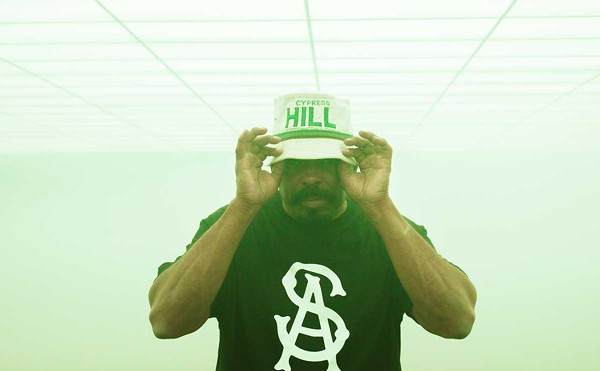Smith and Jones
So Far Away
(Self-released)
Last March, Metro Times explored the underappreciated sounds of downriver hip-hop. The region's highly dedicated and talented emcees continue to produce extraordinary quality hip-hop. This new Smith and Jones album, So Far Away, exemplifies that.
Smith and Jones is made up of Tone Smith, Jimbo Jones, and Chris Parrish (aka Mr. Furious). The album starts off with the title track, "So Far Away." It's a great bounce track in which the emcees talk how they're lyrical slaying other emcees and staying ahead of the game.
"Not Entertained" employs prodigious old-school horns as the trio takes shots at the repetition of today's hip-hop while giving props to yesteryear. One of the most creative aspects of the album is the use of ingenious samples. They pluck the strings from Beethoven's "Symphony No. 5" in the track "Beethoven" and borrow riffs from Carlos Santana's acoustic playing on "Tony Santana."
"Roots of My Sound" rocks hard on an East Coast city clicker beat and the group's chemistry shines on "Bangin Your Eardrums." The album closes with the ultimate homie track, "Its Smith and Jones." The track features over 20 artists and each one tries to rip their verse harder than the previous emcee.
So Far Away gives the listener one thing above all else: good, ole fashioned hip-hop. The album features Nathan Ranking, PHD, Foulmouth, Benny Barra, Mongo Slade, Leaf Erikson, Pig Pen, and Tommy Gunz. The album is about rock-solid boom-bap beats, witty punchlines, and solid bars.
There aren't any corny hooks or obvious radio-friendly tracks. The album is not full of fillers or unnecessary guest appearances. So Far Away is well composed and carefully crafted and it's one of the year's early surprises.
Digital and CD copies of the album available for sale at smithandjones1.bandcamp.com. –Kahn Santori Davis
The John Sims Project
The AfroDixie Remixes
(self-released)
John Sims, a Detroit native, is a multimedia "mathartist," creating projects that span mathematics, art, text, performance, and political-media activism. He is best known for his work with Confederate flags — burning 'em, burying 'em, and eulogizing 'em. His creative body evokes both inspirational and incendiary responses and this comfort with duality shines through on his latest release, The AfroDixie Remixes.
I was thoroughly prepared to dislike this. Listening to 61 minutes of the same song — particularly the Southern anthem "Dixie" — appealed to me about as much as a literal visit to the antebellum South.
But Sims is a homeboy. He was raised at Chicago and Sorrento on Detroit's west side and went to Renaissance High School. Because this expatriate is doing great things in the world, I caved. I listened.
Immediately, Twinkle Yochim's richly textured vocals drew me — 47 seconds in, my response to the "Spiritual Dixie" was so visceral that tears welled in my eyes. Yochim's emotional delivery kicks up the red dirt that lies just beneath the surface for so many of us first-generation Northerners.
Creative reimagining challenges Dixie's shameful and violent past on track after track. There are 14 tracks, and filtered through African diasporic music, the text takes on many new meanings.
Music snobs will be glad to know the interpretations are true to form. Producer Sims maintains the authenticity of genre by assembling a stellar cast of musicians. The instrumental "Jazz Dixie" is tightly performed and it swings just so. The "Samba/Bossa Nova Dixie" conjures a perfect sunny day. The "Gospel Dixie" is big-church-hat-Fifth-Sunday-Youth-Choir Holy Dance worthy. The "Soul Dixie" hearkens us to Motown and shadows the souls of the masses who arrived in Detroit and other northern cities during the Great Migration. The "Jimi Dixie" is appropriately Woodstocky. And the "R&B Dixie" is easily — maybe just a little eerily — pole dance worthy.
But, wait! This is "Dixie." This song is not supposed to be heard that way. Right? Well, therein lies the rub.
Sims brilliantly reinterprets the text and invites listeners to look beyond the stereotypical historical context. This is touchy stuff in light of the Black Lives Matter movement, the ongoing national controversy connected to the Confederate flag, and the crucial narrative regarding devaluation of the black body.
It has been claimed that the Snowden Family Band, a 19th-century African-American musical group, actually wrote "Dixie." Yes, rumor has it that the credited songwriter Dan Emmett appropriated it from them. If this is true, it could be said that Sims is reappropriating past cultural appropriation (see duality referenced above).
Ally Couch's "Jazz Blues Dixie" must be mentioned. It is the standout track that turns "Dixie" into a study of lost love and measured sorrow. There is a quality in her voice that makes every tear ever cried rise to the surface and demand recognition. But, even more, her performance emphasizes poignancy and humanity in the lyrics. It begs to be placed in a movie score.
Sims is an artist of the academic ilk. And often those artists create for other artists. That's fine. But it will be sad if this release does not move from the academic and experimental art establishment spheres to a broader audience.
I smell a Grammy. The Americana category will do nicely.
Digital and CD copies of the album available for sale at afrodixieremixes.com. –Rhonda Welsh






